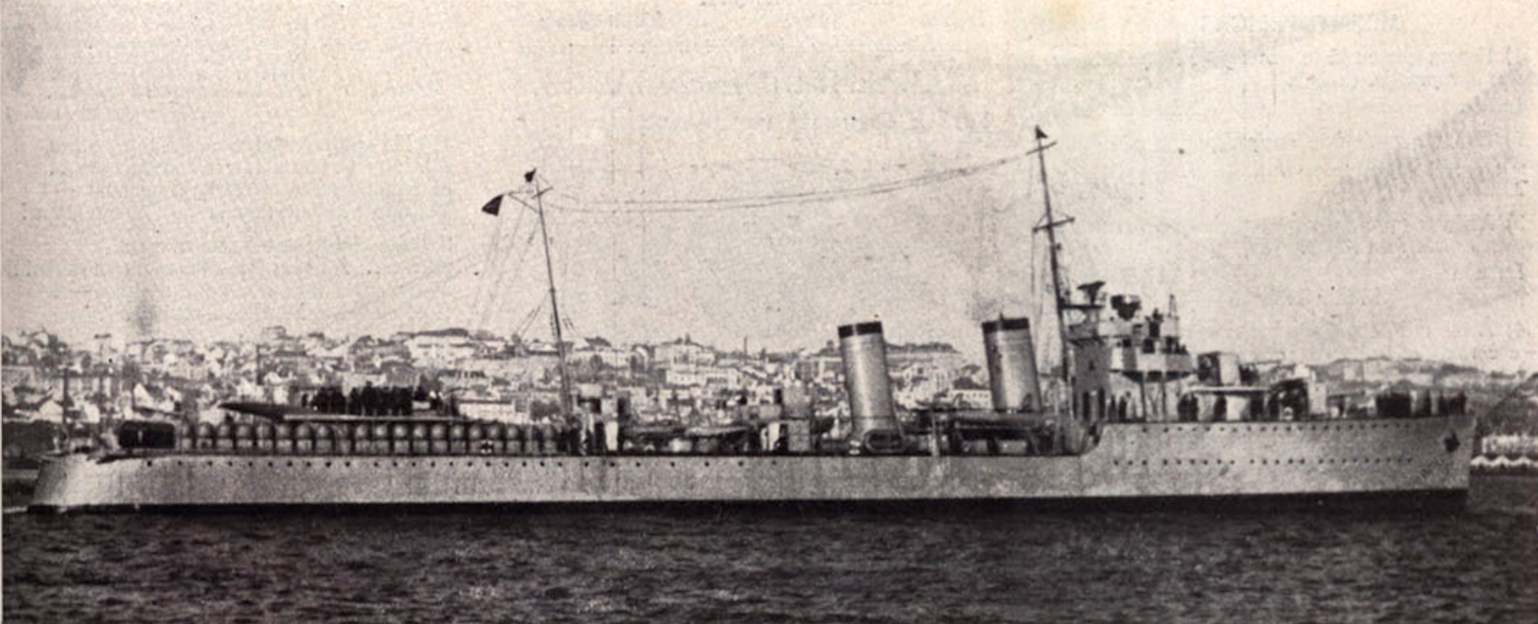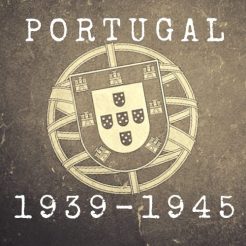
The Portuguese destroyer Dão
(Picture: Unkown Author)
Dão
(Portugal)
Comander: Arnaldo Guedes da Silva Moreira (Cap. Frag.)
Type: Destroyer
Tonnage: 1621
Owner: Portuguese Navy
Homeport: Lisbon
Built: Arsenal do Alfeite, Portugal, 1934
Event: Rescued 16 crew members from the "British Fame" sunk by the italian submarine Alessandro Malaspina.
"Wrecks of all kinds" and a thick layer of oil gave the sea "a mirrored aspect," said the report of the commander of the Portuguese destroyer Dão after finding evidence of the fate of a ship at the hands of the submarines of the Axis. The search and rescue operation had begun a day earlier, with no great results, and even in the sinking area "no corpses or wreckage" appeared.
Frigate captain Arnaldo Guedes da Silva Moreira had been informed of the sinking of the British tanker "British Fame", of 8400 tons, by eight o'clock in the morning on August 12, 1940, when the captain of the port of Ponta Delgada informed him of an SOS received by the Marconi radio system installed in the archipelago. The attack had taken place 135 miles east of the Azorean city.
The destroyer was ready at 2.30 pm, leaving port at full speed to the location where they believed the shipwrecked were waiting for help. Sentries were placed on the bridge with binoculars, but despite the effort the night arrived without sighting wreckage or survivors.
Believing that the lifeboats were trying to reach Santa Maria island the Portuguese commander traced a nocturnal route in that direction, following at low speed and with lights on hoping to detect or being detected by the people in need of assistance.
The morning came without news about the men but they spotted the oil slick and the wrekage of the ship. Using it as a starting point, a search perimeter was established that led the Portuguese to travel 20 miles in North/ South direction and ten in East/ West direction. Certain that no shipwrecked were in the area, the destroyer began a new exploration to the West, in zigzags covering about 20 miles at a time, but again there were no signs of people.
Arnaldo da Silva Moreira began to believe that the survivors must have been collected by some ship that had not made any communication to protect itself from the attack of theU-boats. In an attempt to confirm his suspicion, he ordered a radio message to be sent every half hour urging to be informed of the rescue as he continued to make zigzags towards Ponta Delgada.
The Portuguese authorities also asked the cooperation in the search of the Steamer Carvalho Araújo, which was heading further south, and also of the Panamerican Clipper that crossed the Azorean skies between the USA and Lisbon and vice versa.
Meanwhile, from Lisbon, information arrived that the castaways were halfway of São Miguel, so the Dão returned and began searching 40 miles west of the debris field. It was another night at slow speed with the sunshine bringing no news. At 12.30 hours on the 14th, they entered Ponta Delgada again: "Disgusted by the failure of the operation, which had so badly rewarded the fatigue, goodwill and concern of all, I was still convinced that the shipwrecked had already been collected", Silva Moreira states in his later report.
The next afternoon confirmed that the frigate captain was wrong when a whaler entered Vila Franca with some castaways, and they ensured that they had separated from two other lifeboat the night before. There were also reports, brought by the local port authority, that it could be seen in the distance at Ponta do Arnel two small vessels that did not resemble those used by local fishermen.
At dawn the Dão came out again, but now with the support of a smaller patrol boat to ensure a search party closer to land. Shortly after two in the morning the search resumed and at 9.30 hours in the morning the destroyer found the patroller towing one of the lifeboats that they had found near the land. Between these and the ones that had arrived in Vila Franca the previous day there were 29 men, but there were others. After being taken aboard the destroyer one of the British officers reported that he had lost sight of the third lifeboat on the eve, and that he should be west of where they were. Following the tip, the last 16 missing men were detected. The last whaler was commanded by the mate who had not yet been able to find a place to land.
All shipwrecked immediately received a meal offered by the ship's kitchen, but Portuguese sailors were more generous. There was a supply of clean clothing, food, and there were even two barbers that offered to shave their bearded faces.
Silva Moreira was still surprised by the reaction of the rescued: "Their morale was very high. Although apparently tired and in need of rest, we did not hear a lament or a complain, they did not make a request, they did not curse anyone, nor even the submarine that had made them go through that trance, and whose commander they, moreover, classified as gentlemen by the the way he had treated them. "
The "British Fame" had been sunk by the Italian submarine Alessandro Malaspina, but had been sunk fighting. The artillery carried by the English ship had responded to the attack and at one point he had forced the Italian to dive, but three hours after it started and after being hit by several torpedoes and shells, the tanker surrendered. Three of his men had died.
Malaspina took captive the captain of the ship and, in an act of humanity, towed the whalers about 40 miles to bring them nearer to the shore. That was the reason why all the searches had given such a poor result.
British Fame
(GB)
Captain: William George Knight
Type: Tanker
Tonnage: 8303
Owner: British Tanker Co. Lda.
Homeport: London
Built: GB, 1936
Fate: Sunk by italian submarine Alessandro Malaspina. 3 death, 51 survivors.
Resources:
- Archives/Arquivos: Arquivos Nacionais Torre do Tombo (PT); National Archives UK, Kew (GB); Arquivo Histórico da Marinha (PT);
- Books: Shipping Company Losses of the second World War, Ian M. Malcolm; British and Commonwealth Merchant Ship Losses To Axis subamrines 1939-1945, Alan J. Tennent;

